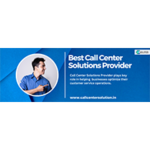Customer service has the power to make or ruin a company’s reputation in the fast-paced commercial environment of today. Businesses want flexible, dependable, and easy-to-use call center solutions to improve client experiences as customer expectations change. However, there is no one-size-fits-all approach to selecting the best call center solution. Every firm has different requirements, so a solution that works well for one might not be right for another. This thorough guide will assist you in going through your alternatives and selecting the best call center solution to meet the objectives of your business.
Assess Your Company’s Needs and Objectives
Knowing your unique demands is the first step in choosing the Right call center solution. Start by posing important queries such as:What is the primary goal of implementing a call center solution?
Are you looking to improve customer satisfaction, reduce call waiting times, or enhance agent productivity?
How many customer interactions do you handle daily?
What channels (such as phone, email, social media, or chat) do your customers prefer?
Having clear answers to these questions will help you select a solution that fits the unique objectives of your business. Businesses with a smaller clientele could profit from a more simple, adaptable system, but companies with huge call volumes, for example, require a system with strong call management skills.
Consider Your Budget and Total Cost of Ownership
In addition to the initial expense, selecting a call center solution means ongoing maintenance, integration, and training expenses. Determine the total cost of ownership (TCO) by carefully examining your budget. This includes:Licensing fees
For example, because cloud-based call center solutions don’t require a lot of hardware, they frequently offer reduced initial costs. Subscription costs, however, can mount up over time, so balance them against the advantages. On-premise solutions have a higher upfront cost, but if you intend to use them for a number of years, they can end up saving money over time. Make an informed choice that matches your budget by comparing the total cost of ownership (TCO) of several solutions.
- Equipment and infrastructure expenses
- Implementation and integration costs
- Ongoing maintenance and support fees
Explore Cloud-Based vs. On-Premise Solutions
There are now two primary categories of call center solutions: on-premises and cloud-based. Each has unique benefits and drawbacks. Cloud-Based Solutions: These systems are accessible remotely from any location because to their internet-based operation. Cloud-based solutions are popular among businesses with remote staff or those looking to cut infrastructure costs because they provide scalability, flexibility, and lower maintenance costs. On-Premise Solutions: These solutions need physical upkeep and hardware installation on your business’s property. Businesses with stringent regulatory requirements may benefit from the increased control over security and data management that on-premise solutions provide. However, they need a large initial input of funds as well as continuous upkeep. Before selecting the model that best fits your company’s objectives, consider its technical infrastructure, data security requirements, and flexibility demands. Related Article: India’s Leading Call Center Solutions ProviderFocus on Scalability for Future Growth
As businesses expand, their operational requirements also develop. Select a call center solution that will grow with your business. Examine whether the solution enables you to expand the number of users or channels and add or remove features as needed without needing to redesign the entire system. Scalability is especially crucial for companies whose call traffic varies seasonally. By adapting your system to demand, a scalable solution will help you avoid having to pay for capacity that isn’t being used or finding it difficult to manage an expected spike in client contacts.Prioritize Security and Compliance
Businesses now have serious concerns about data security, particularly those that handle sensitive client data. Choosing a system that satisfies industry-standard security and compliance rules is essential because call centers frequently handle financial information, personal data, and transaction details. Seek out solutions that include secure data storage, encryption, and adherence to legal requirements like the Health Insurance Portability and Accountability Act (HIPAA), if any, or the General Data Protection Regulation (GDPR). To guarantee data security in the case of an outage or cyberattack, you should also ask about the solution’s backup and recovery features.Compare Analytics and Reporting Features
You can track call center performance, pinpoint areas for development, and make informed decisions with the use of analytics and reporting tools. Look for features like these while assessing call center solutions:Real-time monitoring of call metrics (average handling time, call resolution rate, etc.)
Customizable reports for tracking performance trends
Analytics dashboards that offer insights into customer behavior and agent productivity
By highlighting patterns that could otherwise go overlooked, common pain spots, and trends in customer questions, advanced analytics tools can also aid in strategic decision-making. These insights enable companies to improve their customer service procedures over time.

